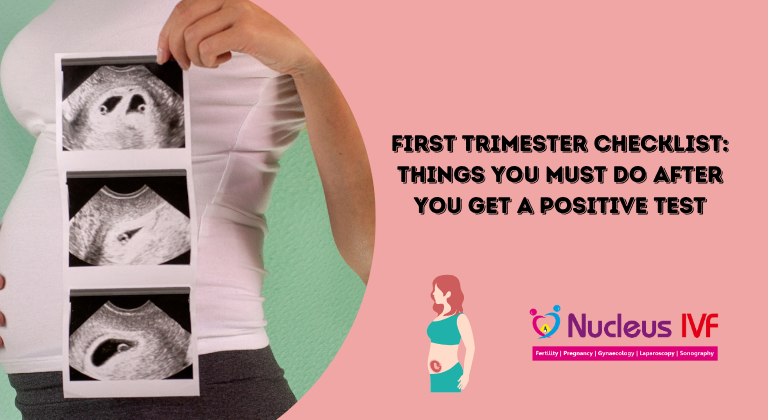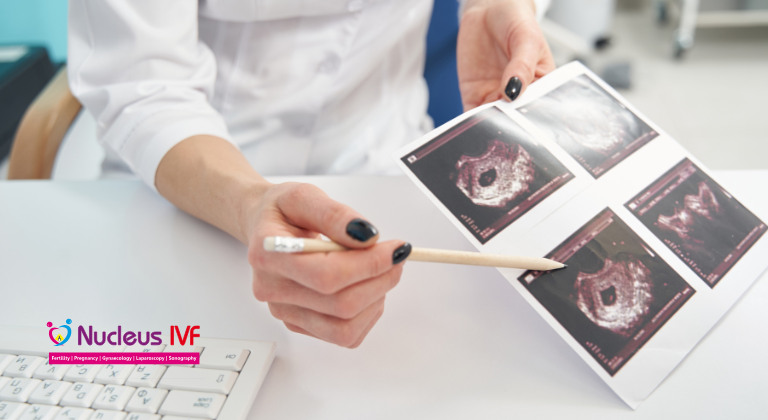You’ve just seen those two pink lines or received the confirmation blood report — you’re pregnant! While this is an exciting milestone, it’s also the beginning of many new decisions and responsibilities. The first trimester (weeks 1 to 13) is a crucial period in fetal development, and following the right steps now can make a huge difference for both mother and baby.

At Nucleus IVF, Wakad Pune, Dr. Pritam Sulakhe outlines an essential checklist that every newly pregnant woman should follow during her first trimester.
✅ 1. Schedule Your First Prenatal Appointment
Booking a doctor’s appointment should be the first thing you do after getting a positive test.
Why it’s important:
- Confirms pregnancy through blood test (beta-hCG)
- Ultrasound to check for fetal heartbeat or gestational sac
- Collects detailed medical history to evaluate potential risks
What to expect during your visit:
- Pelvic exam
- Blood and urine tests
- Lifestyle assessment and future prenatal plan
🩺 At Nucleus IVF, Dr. Sulakhe takes the time to explain your baby’s early development and what you should expect in the coming weeks.
✅ 2. Start Prenatal Vitamins
Early in pregnancy, your baby’s brain and spine begin forming — which is why folic acid and other supplements are so crucial.
Essential supplements you should start immediately:
- Folic Acid (400–500 mcg/day): Prevents neural tube defects
- Iron: Helps prevent anemia
- Calcium & Vitamin D: Strengthen bones for both mother and baby
- Omega-3 & DHA: Promote healthy fetal brain development
📝 Consult your doctor before starting anything — not all over-the-counter brands are safe.

✅ 3. Focus on a Nutrient-Rich Diet
Your eating habits will directly impact your baby’s growth in the early weeks.
Eat more of:
- Leafy greens (iron, calcium, folate)
- Whole grains (fiber, energy)
- Fruits like oranges, bananas, and apples (vitamins, hydration)
- Proteins: dal, paneer, chicken, and eggs (muscle and tissue building)
Avoid or limit:
- Raw/undercooked eggs and meat
- Soft, unpasteurized cheeses
- High-sugar snacks and sugary drinks
- Fish with high mercury (like shark, swordfish)
💡 Tip: Try eating smaller, frequent meals throughout the day to reduce nausea and boost energy.
✅ 4. Learn the Do’s and Don’ts Early
This is the time to avoid harmful habits and make pregnancy-safe lifestyle choices.
DO:
- Drink plenty of water
- Sleep 7–8 hours per night
- Practice light walks or prenatal yoga
- Track your prenatal appointments
DON’T:
- Drink alcohol or smoke
- Take medicines without a doctor’s approval
- Engage in high-risk activities or heavy lifting
- Stress unnecessarily — stay calm and informed
⚠️ Always ask your doctor before taking painkillers, antibiotics, or herbal remedies.
✅ 5. Prepare for Common Pregnancy Symptoms
First-trimester symptoms can be challenging, but manageable with the right approach.
You may experience:
- Morning sickness
- Fatigue
- Mood swings
- Food aversions
- Tender breasts
How to manage them:
- Eat plain crackers before getting out of bed (reduces nausea)
- Take vitamin B6 (with doctor’s approval)
- Rest often and reduce screen time
- Use warm compresses for breast soreness
💬 Remember, these symptoms are usually temporary — they signal that your hormones are working!
✅ 6. Know the Warning Signs
While most pregnancies progress smoothly, some warning signs should not be ignored.
Call your doctor immediately if you notice:
- Heavy vaginal bleeding
- Severe cramping or abdominal pain
- Dizziness or fainting
- Fever above 100.4°F (38°C)
- Persistent vomiting and dehydration
🩺 Early intervention can prevent complications and save lives.
✅ 7. Emotional and Mental Health Support
Your body isn’t the only thing going through changes — your mind is too.
Tips for mental wellbeing:
- Stay in regular touch with your doctor
- Journal your feelings, fears, and joys
- Practice guided breathing or meditation
- Join prenatal groups or forums for support
🧘 Nucleus IVF provides emotional and psychological counseling services to support your journey from conception to delivery.
✅ 8. Get Early Screening and Lab Tests
During the first trimester, several important screenings help assess both your and your baby’s health.
You may need:
- Blood group & Rh typing
- Thyroid panel
- HbA1c or blood sugar
- Ultrasound for dating scan
- NT scan for chromosomal abnormalities (at 11–13 weeks)
🧪 These tests help catch conditions like gestational diabetes, thyroid imbalances, and infections early.
✅ 9. Adjust Your Lifestyle and Environment
Your home, workplace, and daily routine will likely need small adjustments.
Consider:
- Limiting exposure to harsh chemicals and pesticides
- Avoiding climbing stairs frequently
- Wearing non-slip footwear
- Delegating physically strenuous chores
- Preparing for future maternity leave
👟 Comfort, rest, and safety are priorities during these delicate weeks.
✅ 10. Educate Yourself Without Overloading
Pregnancy brings lots of advice — some helpful, some outdated.
How to stay informed:
- Follow your doctor’s advice first
- Subscribe to one trusted pregnancy app
- Read Indian pregnancy blogs backed by doctors
- Ignore unsolicited and superstitious advice
📱 At Nucleus IVF, we guide expectant mothers with scientifically correct information in simple language.
Final Words: You’ve Got This, One Week at a Time!
The first trimester can be overwhelming, but with the right steps, it becomes empowering. You’re creating a life — and that’s no small thing! Trust your body, trust your medical team, and take things one day at a time.
If you’re in Wakad, Pune or nearby areas like Hinjewadi, Baner, or Pimple Saudagar, visit Nucleus IVF for compassionate care, expert advice, and the best facilities.
📞 Book your first-trimester consultation with Dr. Pritam Sulakhe today!
Dr. Pritam Prakash Sulakhe
Dr. Pritam Prakash Sulakhe
author
Dr. Pritam Prakash Sulakhe has completed his MBBS from B J Government Medical College , Pune which is one of the top medical College in India. He continued his post-graduation as DGO at same institute. After that he opted for Diplomat Of national Board In Obstetrics and Gynecology from Kerala Institute Of Medical Sciences Trivandrum, which is one of the most prestigious institute from South India.


